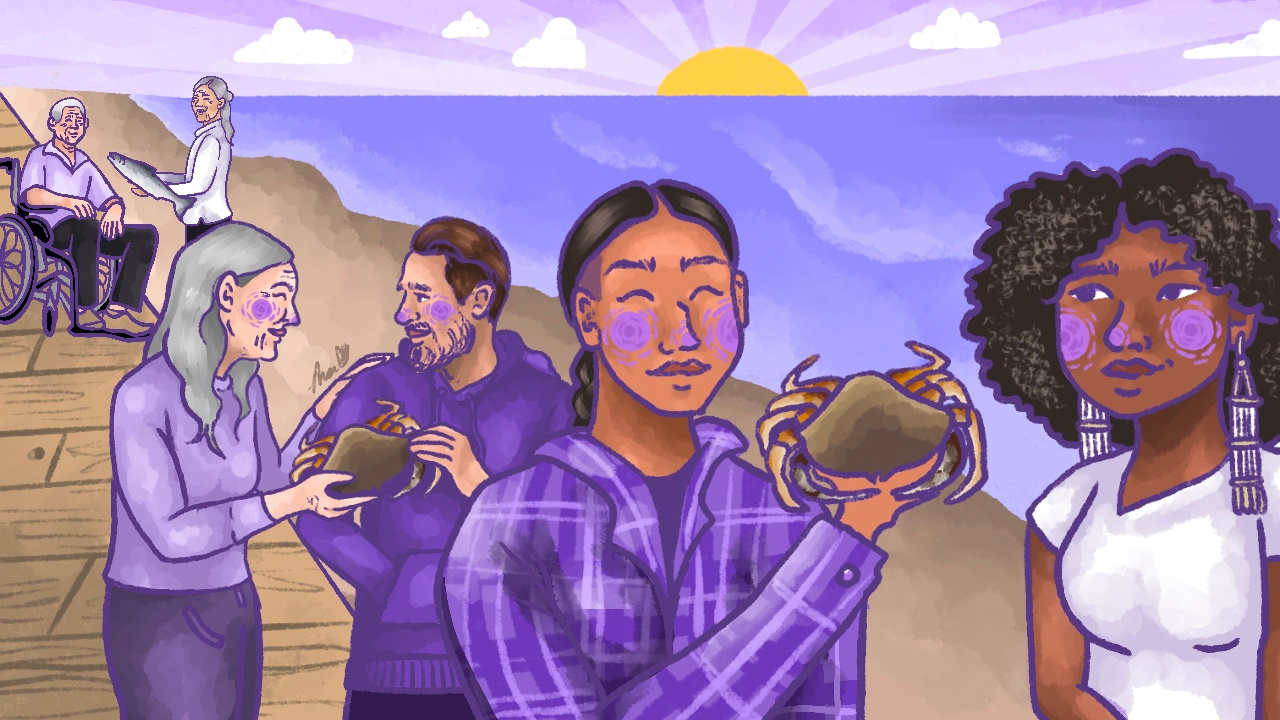
A project by the BCCDC to understand the food and climate experiences of people living in remote communities in British Columbia (BC)
Tahsis
A story of community support and sharing


British
Columbia
Tahsis
This is the story of Tahsis, a remote non-Indigenous community on Vancouver Island, as told by six residents – Mandy, John, Patricia, William, Trevor and Sarah.


Where are we located?
The village of Tahsis is in Nootka Sound on Vancouver Island's west coast, at the head Tahsis inlet’s North Arrow. Tucked in the mountains on the traditional territory of the Mowachaht/Muchalaht First Nation, it has stunning ocean and forest scenery.
Tahsis is located 154 kilometres (a 2-3 hour drive) from Campbell River and 66 kilometres from Gold River (a 60-90 minute drive). The scenic road between Tahsis and Gold River, named the “Tree to Sea” drive, can be dangerous and unpredictable.



Home to about 500 year-round residents, Tahsis’ population grows to 1,500 people during summer due to eco-tourism and recreation in the area.
Services in the community include a general store, public library, health centre, post office and sports facilities. There are two restaurants, one that is open year-round and a resort restaurant which operates between May and September. The single school in Tahsis serves 31 students in Kindergarten through Grade 12 and offers adult learning and high school upgrading.
Most Tahsis residents are retired and rely on modest fixed-incomes from Old-Age Security and the Canada Pension Plan (approximately $17,500 annually before tax). Tahsis’ population was once much bigger due to employment at the sawmill. Many services, including a bank and pharmacy, closed with the sawmill in 2001.



Limited selection and high food costs
Tahsis’ local store carries groceries, essentials, liquor and fuel. Food quality and availability have recently improved thanks to efforts by the store owner.
Residents acknowledged that shipping costs and smaller volumes contribute to high prices at small stores in remote communities like theirs, but they expressed ongoing concerns about selection, rotten or moldy foods and especially about high food costs.
“We pay a lot of money for food at the one retail store in our community.”
“… it’s very expensive here. Very expensive.”
“Price, price. Price is why [I don’t shop in town].”
“… the cost on several of the items at the grocery store is enormous and unaffordable, and I know lot of times people [have] chosen to go without certain items… But that’s the way it is out here, unfortunately.”
The long trek to town
Most Tahsis residents travel for food shopping. A Co-op Grocery Store recently opened in Gold River - this was the first grocery store there in seven years – but most people prefer to travel further to Campbell River to shop at larger supermarkets with more variety, availability, bulk purchasing options and lower prices.
This trip can be exhausting and treacherous. Trevor, who is in his 40s, described the day long trip.
“Due to the sheer physical exhaustion of the trip, I usually have to take a day off to recover. My back and legs hurt a bit from the fact I’m sitting in a vehicle 6-8 hours in one day. That about sums up my adventures to go buy food and supply once a month or once every two months depending on the roads”
Road and weather conditions can be challenging and sometimes unsafe. Erosion and narrowing on sections of the 75-kilometer gravel logging road, called “Head Bay Road”, create steep drop-off cliffs along the roadside.
“Winter is extremely difficult. The transportation is the main issue when the weather is bad.”
The trip requires a reliable vehicle, good tires and a good deal of planning. Many pack chains, jumper cables, blankets and emergency supplies. Some bring chainsaws in case a fallen tree blocks their way, and flat tires and breaking down are common worries.
“Whenever I go on the road, I bring overnight gear and equipment, snacks to survival supplies. Just in case.”
In a remote community like Tahsis, access to a vehicle is a necessity and an essential part of food security.
“My car… is necessary here, it’s not a luxury. We don't have bus service, and I'm disabled. So I can't get around without some kind of transport.”
But there are challenges to accessing transportation: Gold River is the closest place to get vehicle insurance and driver’s license, and Tahsis lacks public transit services. Not everyone has access to a vehicle, and many rely on neighbours for rides and errands.
Some people order pantry items through Amazon to pick up at the post office. Trevor does this to alleviate some of the stressors of traveling out of town to stock up on non-perishables.
“Amazon has a tremendous amount of pantry items that are a good price or the same price as Walmart or Costco. We’re having a lot of our pantry items and non-perishables shipped in.”
As of the publishing of this story, the co-op store has closed. The closest full service store is now in Campbell river
Map showing the only grocery store in Tahsis.
Credit: Google Maps

GROCERY STORE






Accessing market foods
Many people get groceries from Campbell River only once per month. Including food and fuel costs, the trip can cost $1000 or more. Fuel alone can cost $100 to $200 round trip, and as vehicles and tires wear out quickly in rough road conditions and weather, vehicle maintenance and servicing become costly, as well. Many plan shopping trips to align with payday and worry about these costs.
“That's one of the things I stress about, too. Is there even any money in this account to cover this grocery bill?”
“You think about it, the more you spend in fuel, that’s the less you’re able to put on your plate.”
Residents manage food between infrequent shopping trips by making shopping lists and meal planning to make sure perishable foods are used first and that there is enough food to last between trips.
Getting enough nutritious food is difficult, especially in the winter. Once fresh, perishable foods are eaten, mostly non-perishable foods remain for the rest of the month.
Many worry about lack of variety in their diets, especially residents like Patricia who find it challenging to eat for chronic disease management and optimal health on a fixed income.
“I find it difficult sometimes to find affordable foods that satisfy my diabetic diet requirements. I need to have a low carbohydrate, high protein diet, and it's difficult to get here with any sense of variety.”
“For me, the access, availability and cost of food is affecting my well-being because I have to choose between maybe healthy food or cheap food.”
Food preservation and storage for winter is a priority for Tahsis residents. One resident stocks two large chest freezers year-round and an additional chest freezer in the winter, with enough food to last from October to June. But not everyone can do this, as cost and space limit access to freezers and storage.
The favour economy and volunteerism
Tahsis residents without vehicle access rely on friends and neighbours to collect groceries from Campbell River and help with other errands. Sarah called this giving and receiving of acts of kindness "the favour economy”. Seniors living with health concerns, limited mobility or living alone rely heavily on this favour economy.
Community members appreciate the reciprocal favour economy, and many are happy to help one another.
“It's a nice place to live. We take care of each other in a lot of ways, because there are so many people volunteering and working together.”
However, some people struggle with receiving favours and feel like a burden to others.
“It's important to understand how hard it is to rely on people and getting favours all the time.”
“…but you have to be careful about that because you don't want to impose. You don't want to become a burden, and you want favours you ask to be manageable for the person you're asking to do them… I used to be the one who did those things, then I find it uncomfortable to see myself switching positions now as I'm getting older and less able, I'm the one who needs favours not the one who does favours. It's a different role and it’s kind of embarrassing.”
Tahsis residents are grateful for the charitable food programs in the village. Without these programs, some residents would have to choose between heating their homes or buying food.
Teamwork and volunteerism keep this community going. The people are generous, kind and caring. However, volunteers can experience burn out, leading to gaps in volunteer run services and supports.








Local foods and
climate change
Hunting and fishing provide seasonal access to food from land and sea. But it can be cost prohibitive. Hunting requires vehicle maintenance, fuel, firearm licensing and purchasing, ammunition, a permit and more. During summer, offshore fishing is restricted, so access to a boat is needed.
Climate change and commercial activities, especially logging, have significantly impacted local gathering and hunting.
“It’s been tough for foraging for mushrooms, whenever its mushroom season I’m always out picking mushrooms, but it’s been slim pickings for mushrooms because of the logging.”
“The loggers are taking away [trees] for the animals to be around as well. You can’t access them 'cause they're going to go higher up because of the mountain. They’re not able to come down, so you can't go hunting.”
The fish population has also declined over time.
“When I first moved here, there were more fish available. Seems like the fish population is dwindled so much that that's not really the kind of abundant resource when I first moved here even just six years ago. People greeted each other with fish and crab. That is no longer available as a giveaway because we don’t have them anymore. I haven’t seen a fresh crab in a while.”
There used to be more farms in the area, but the local food economy today is small. Community members share or sell homemade food during the summer and exchange food through a garden cupboard pantry. Bill would like to see more local food options and infrastructure to grow local food.
“It would be great if we could grow our own food here. Like we have some sort of co-op or some initiative where we just had our own greenhouse and we grew our own vegetables. That would be good.”


Hopes for the future
Residents shared recommendation and hopes for improving the future of food access and affordability in Tahsis.
- A food storage and distribution center to run food programs. This could be as simple as a shipping container that keeps food dry and off the ground and a covered pick-up area so residents don’t have to stand in the rain.
- Food subsidies that go beyond fruits and vegetables, such as for eggs, fish, meat, and other protein sources.
- A greenhouse for year-round food production.
- Better transportation options, such as a community van for grocery shopping and other needs such as banking and medical appointments.
- Funded positions to enhance community food security.
The Stories Project Team, BC Centre for Disease Control Food Security Team and the Project Advisory Committee would like to sincerely thank the six residents of Tahsis who shared their stories and experiences (Mandy, John, Patricia, William, Trevor and Sarah)
For more information about the Food Costs and Climate Change Stories from Remote Communities in British Columbia Project, please email: foodsecurity@bccdc.ca
Illustrator: Moe Butterfly